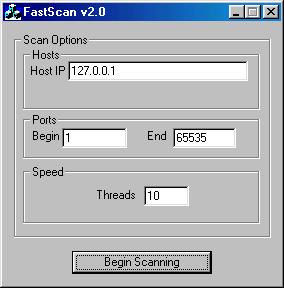
A Port is the "bridge" the data flows through for a certain Protocol
A Port Scanner is a program that probes certain ports in a PC. Most Port Scanners start at a certain IP address (for example, 172.193.144.38), then scan the selected ports, moving on to the next IP address after each system has been scanned. Often, they create a log of the IP addresses that open ports are found at. Here is FastScan, a extremely common Port Scanner.

ISP stands for Internet Service Provider. An ISP is who you go through to get your connection to the web. Probably the most well known ISP is AOL. There are also Local ISP's. Local ISP's are usually based in the town they serve. You are provided with a local number to dial to connect. Nationwide ISP's, like and AOL, have many locations. You are usually assigned a 1-800 number. Although services like AOL are usually slower, they provide people who travel a lot with the opportunity to connect from almost anywhere in the country. ISP's are also referred to as Dial Up servers, simply because your PC "calls" the number with your modem.
Chat programs are similar to chartrooms. They provide you with a way to talk to other people who are also online. But instead of having to stay in the chat room, you can chat and also surf the web at the same time. The most common Chat Programs are Yahoo Messenger and ICQ. AOL Instant Messenger is also quite common. This is Yahoo Messenger, one of my favorites.

Netstat is a great Windows utility that allows you to see all active connections on your PC. To use Netstat, go to Start, Run, and type command.com (your DOS prompt). Now type netstat -a and press enter. If you are connected to the web, you will probably see numerous connections. If you are not connected to the web, you will probably only see two connections. This Utility is very useful if you suspect somebody may have exploited a security hole in your PC.